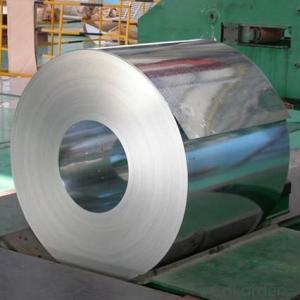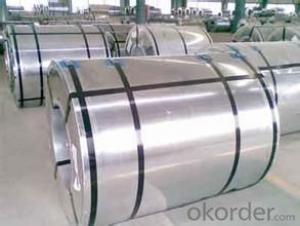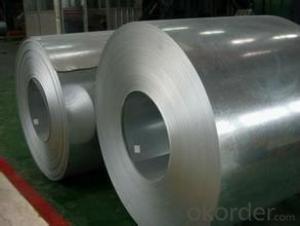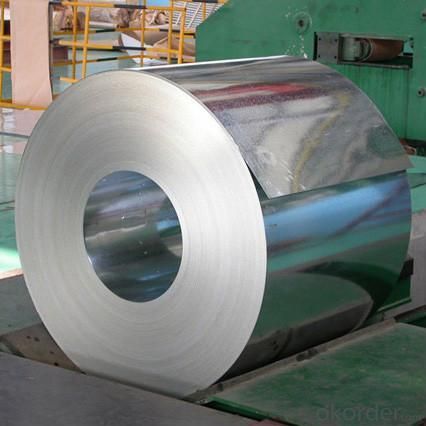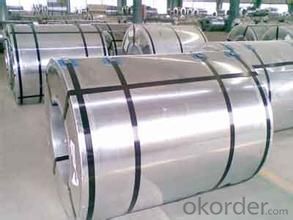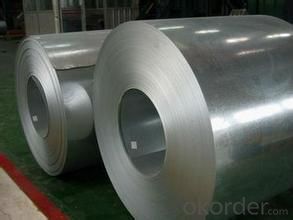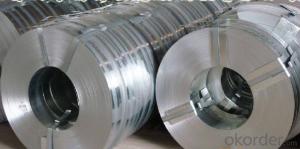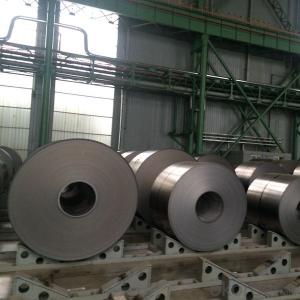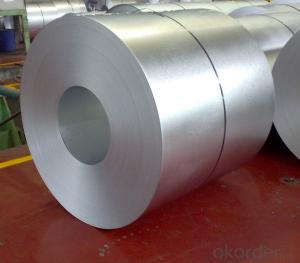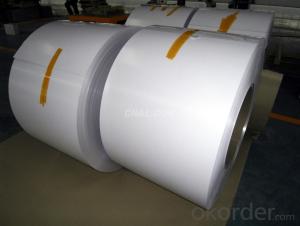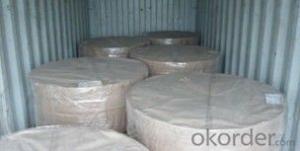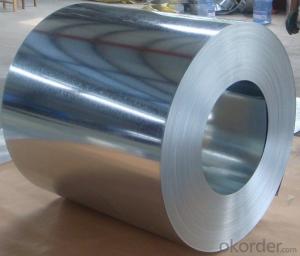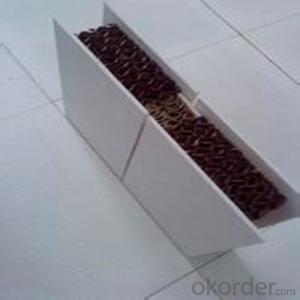Galvanized Steel Coil in Best Condition
- Loading Port:
- Tianjin
- Payment Terms:
- TT or LC
- Min Order Qty:
- 50 m.t.
- Supply Capability:
- 5000 m.t./month
OKorder Service Pledge
OKorder Financial Service
You Might Also Like
Specifications
galvanized steel coil
1 madefrom cold rolled steel
2 hot dip galvanized
3 zinc 60-150g/sqm
4 0.14-1.5mm*600-1250
Advantages of galvanized steel coil:
Anti oxidation
High strength
Easy be formed
Low in costsa
Durable
Nice appearance
Size
Thickness: 0.145mm-1.5mm
Diameter: 508mm
Width: 600mm-1500mm
Length: as request
Color: as request(if need)
big spangle/ normal spangle/ small spangle/ no spangle
oiled/ uncoiled
acid cleaning/ not acid cleaning
edge: smooth
Packing & Delivery
Brown paper and waterproof materials
Steel strips enlaced
Container type: 20ft container
20ft Container introduce:
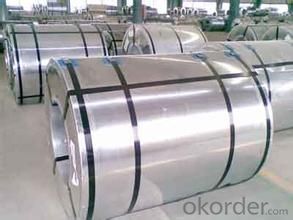
- Q: What is the process of applying anti-slip coatings to steel sheets?
- The process of applying anti-slip coatings to steel sheets typically involves several steps. First, the steel sheets are thoroughly cleaned and prepared to ensure proper adhesion of the coating. This may involve removing any dirt, oil, or rust from the surface. Once the surface is clean, a primer or bonding agent is applied to enhance the adhesion of the anti-slip coating. The primer is allowed to dry or cure according to the manufacturer's instructions. Next, the anti-slip coating is applied to the steel sheets using a suitable method, such as spraying, rolling, or brushing. The coating is evenly distributed and applied in the desired thickness to ensure effective slip resistance. After the coating is applied, it is left to dry or cure according to the product specifications. This may involve air drying or using heat to accelerate the drying process. Once the coating is completely dry and cured, the steel sheets are ready for use. The anti-slip coating provides a textured surface that enhances traction and reduces the risk of slipping, making it suitable for various applications where slip resistance is crucial.
- Q: What safety precautions should be taken when handling steel sheets?
- When handling steel sheets, it is important to take the following safety precautions: 1. Use appropriate personal protective equipment (PPE) such as gloves, safety glasses, and steel-toed boots to protect against cuts, abrasions, and possible falling objects. 2. Ensure proper body mechanics and lifting techniques when handling heavy steel sheets to prevent back strain or injuries. Consider using mechanical aids like cranes or forklifts when necessary. 3. Inspect the sheets for sharp edges, burrs, or other defects that could cause cuts or punctures. If any defects are found, they should be addressed or the sheet should be replaced. 4. Store the steel sheets in a stable and secure manner, ensuring they are properly stacked and secured to prevent them from falling or shifting. 5. Use caution when transporting the sheets, ensuring they are securely fastened and properly balanced on carts or trucks to avoid accidents or injuries. 6. Avoid working alone when handling large or heavy steel sheets. Having a colleague nearby can provide assistance and ensure prompt response in case of emergencies. 7. Maintain a clean and organized work area to minimize the risk of tripping or slipping on debris or loose materials. 8. Follow proper material handling procedures and techniques to prevent accidental drops or improper placement of the steel sheets. 9. Take precautions against fire hazards by keeping flammable materials away from the steel sheets and having appropriate fire extinguishing equipment readily available. 10. Provide training and instruction to all personnel involved in handling steel sheets to ensure they are aware of the hazards and safety procedures associated with this task.
- Q: How do steel sheets perform in fire-rated applications?
- Steel sheets perform well in fire-rated applications due to their high melting point and excellent structural integrity. When exposed to fire, steel sheets maintain their strength and stability, making them a reliable choice for fire-resistant construction. Moreover, steel sheets do not contribute to the spread of fire or the release of toxic fumes, enhancing the safety of occupants during a fire incident. Additionally, steel sheets offer excellent thermal insulation, helping to prevent the transfer of heat from the fire to other areas of the building. This property allows for the containment of fires and limits the damage caused. Overall, the use of steel sheets in fire-rated applications provides a robust and effective solution for fire protection in buildings.
- Q: Are steel sheets suitable for automotive body panels?
- Yes, steel sheets are suitable for automotive body panels. They provide excellent strength, durability, and crash-resistance, making them a popular choice in the automotive industry. Additionally, steel sheets are cost-effective and easily customizable, making them an ideal material for automotive body panels.
- Q: How do you measure the thickness of steel sheets?
- One common method to measure the thickness of steel sheets is by using a tool called a micrometer. Micrometers are precision instruments that have a calibrated screw mechanism allowing for accurate measurements. By placing the steel sheet between the anvil and spindle of the micrometer and gently tightening the screw until it touches the sheet, the measurement can be read from the micrometer's scale. Another method is to use a caliper, which can also provide accurate measurements by gently closing the jaws around the sheet and reading the measurement from the caliper's scale.
- Q: Can steel sheets be used for staircases?
- Yes, steel sheets can be used for staircases. Steel sheets are commonly used as the base material for staircases due to their strength, durability, and versatility. They can be fabricated into different shapes and sizes to create sturdy and visually appealing staircases.
- Q: Are steel sheets suitable for cold storage applications?
- Cold storage applications can benefit from the use of steel sheets. Steel, known for its durability and strength, can withstand the low temperatures typically required for cold storage. This material is resistant to corrosion and does not absorb moisture, making it ideal for maintaining the cold air within the storage area. In addition, steel sheets are easy to clean and sanitize, ensuring the hygiene and safety of stored items. With excellent insulation properties, steel helps maintain a consistent temperature within the cold storage facility. Furthermore, steel sheets can be customized and fabricated to meet specific size and shape requirements for cold storage. In conclusion, steel sheets provide a reliable and practical solution for cold storage needs.
- Q: Are steel sheets resistant to staining or discoloration?
- Yes, steel sheets are generally resistant to staining or discoloration due to their nonporous nature and protective coatings.
- Q: Are steel sheets available in different patterns or textures?
- Indeed, one can find steel sheets in a multitude of patterns and textures. Although conventional steel sheets possess a smooth and unadorned appearance, there exists a wide array of alternatives featuring diverse patterns and textures. These patterns can be skillfully embossed, delicately etched, or expertly brushed onto the surface of the steel, thereby enhancing its aesthetic appeal. Some frequently encountered patterns include diamond, checker, or grid patterns, while textures can range from a subdued and velvety matte finish to a more lustrous and reflective surface. The availability of these diverse patterns and textures bestows upon designers a greater degree of flexibility, rendering them suitable for a myriad of applications, such as architectural endeavors, interior design projects, or ornamental components in furniture and fixtures.
- Q: Are steel sheets suitable for railway track construction?
- Yes, steel sheets are suitable for railway track construction. Steel is a highly durable and strong material, making it ideal for withstanding the heavy loads and constant traffic of trains. Steel sheets are often used as the base for railway tracks, providing a solid foundation for the rails and ensuring stability and reliability. Additionally, steel offers excellent resistance to wear, corrosion, and deformation, which are crucial factors in maintaining the long-term performance of railway tracks. Its high strength-to-weight ratio also allows for lighter track structures and reduced maintenance requirements. Overall, steel sheets are a popular choice in railway track construction due to their strength, durability, and cost-effectiveness.
Send your message to us
Galvanized Steel Coil in Best Condition
- Loading Port:
- Tianjin
- Payment Terms:
- TT or LC
- Min Order Qty:
- 50 m.t.
- Supply Capability:
- 5000 m.t./month
OKorder Service Pledge
OKorder Financial Service
Similar products
Hot products
Hot Searches
Related keywords
